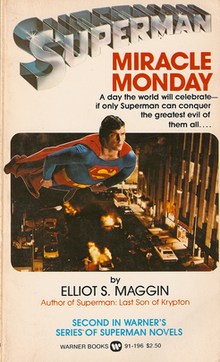Miracle Monday by Elliot S. Maggin, 1980
I had long heard how great a Superman writer Elliot S. Maggin is. Mark Waid, in particular, embraced some of Maggin's ideas for the reboot Rebirth in the early 2000s.
Full disclosure: I missed out on Maggin, not having come into superhero comics until the late '80s. When I dived into comics history years later, I looked to the early days of the medium (the 1930s and '40s) and absolutely missed out on the '70s.
Maggin's second Superman novel, Miracle Monday, is a home run, a distillation of everything vital about him.
What is vital about the classic Superman? Reading Maggin's book is a sore reminder of just how badly DC Comics has missed the mark for Clark Kent/Kal El for a while. I believe you can make a great Superman that isn't a connect-the-dots to a pre-Crisis version--Crisis changed several elements of his world, but still maintained the inherent truths about the character.
Nature and Nurture.
Superman has two dads. He may have inherited Jor El's dignity and love of life, but it was Jonathan Kent who served as his conscience and moral compass growing up. Maggin starts Miracle Monday with Jonathan's nightmare that Clark becomes Superboy and turns into a tyrant with zero regard for life. It's when Clark displays a refusal to even kill a bug for a science experiment that Jonathan realizes he's ready to use his powers.
Smallville is crucial to his development.
"The world was his playground and campus, superhuman senses his teachers, the anonymity of the Kent home his womb and protection. He was alone in all this sense and knowledge, monumentally alone...The boy was alone, but he was never bored." (20)
Less creative writers just look at Smalltown like it was Mayberry, but without the character. Small towns (I know, I was born and raised in Farmville, Virginia) are a great place to have a home life that cuts off the outside noise but, because of the limited opportunities in one, they are also places where arguably more importance is placed on the "little things" like school dances and the neighborhood diner. It's also a place where relationships built on trust are collateral for bank loans (20) and anonymity is hard to come by--making it even more of a challenge for Clark to hide his powers and great practice for adulthood.
Since small towns are generally so quiet, they are fantastic places to sit with your thoughts. Superman is, if anything, introspective about humanity and his place in it.
Superman sees the world differently than we do.
Mark Waid admittedly used this device in Birthright, and to great effect. Maggin has Superman able to see an aura around all living things; these auras can reflect mood. The lazy writer would have Superman simply look for a negative colored aura and know who to save. Maggin has Superman also able to see the fading of an aura as something dies. Think of how much more we would value life if we could see things beyond the surface?
Because Clark is able to value life on that level, he vows to never, ever "be responsible for the loss of" a human life. In regards to coming of age, Maggin has this the point in which he's ready to become Superboy.
Superman loves being Clark Kent.
Maggin has Superman give Clark a lovely quirk: he videotapes commercials and shows them to anyone coming over to visit. It's an absolute broadcasting geek quirk, but also shows the ends to which Superman finds endearment in being his alter ego. There's also a huge development in the book that underscores how vital Clark is to Superman's mental and emotional well-being.
I'm writing this a few years after DC Comics had Superman give up the Clark Kent side of his life, which is one of the least-informed and thought-out decisions ever done with the character. Granted, the modern Superman has been Clark first and Superman second--most of the time, depending on who has rebooted it.
But, even taking the Byrne perspective on the character, why would he ever give up Clark Kent? Clark is Superman's ability to not only have the acceptance of humanity on their own level, but it's a chance for him to study humanity through the writing Clark loves as a journalist. Giving up that side of him would deprive him of the part that lets him be "man" when he's not out having to be "super" and save people.
And that is what makes Superman relatable and empathetic to readers. Maggin's Miracle Monday may be over forty years old, but his grasp of the character is far from outdated.



Comments
Post a Comment